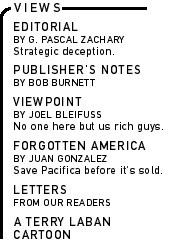

|

|

|

|
| |
|
|
|
Since my on-air resignation on January 31 from Pacifica's national daily news show, Democracy Now!, and my call for a nationwide campaign to oust the Pacifica Foundation's board of directors, thousands of listeners responded with e-mails and phone calls. By an overwhelming margin, they expressed support for my actions. Many asked how they could help. A few, however, were confused about one of the tactics I am urging--a national listener boycott of funds to Pacifica. Along with some activists who have been fighting the corporate takeover of Pacifica, and many staff members at the five Pacifica stations, those few worry that a listener boycott risks destroying the only independent, left-wing radio network in the country. Those concerns should not be dismissed lightly. Neither should they be accepted outright. A complex and vibrant mass movement has emerged throughout this country during the past few years out of the battle over the future of Pacifica. This movement reflects the increasingly critical role that modern instruments of mass communication play in shaping public consciousness, especially in politics, culture and society. The fight to control the dissemination of information--or in our case, to preserve what little space remains for dissenting views--is pivotal for the viability of any social movement. Pacifica's five FM radio stations were regarded for years by the politically powerful in this country as irrelevant gadfly operations. But as the mass media's role as a vehicle for social control grew, so did the importance of this small independent network based in five of the nation's key metropolitan areas--Houston, Los Angeles, New York, San Francisco and Washington. Before most listeners realized it, control of the Pacifica Foundation, which operates the five stations, fell into the hands of a group of directors with no connection to the radical and peace movements that gave birth to the network. Those directors quickly changed the foundation's by-laws to create a self-perpetuating board and remove all public accountability. Several of them apparently fancy themselves trailblazers for black empowerment. This group includes former chairwoman Mary Frances Berry, head of the U.S. Civil Rights Commission; Bertram Lee, a media entrepreneur and former Denver Nuggets owner; John Murdock of the notorious union-busting law firm of Epstein, Becker, Green; and Ken Ford of the National Association of Home Builders. For nearly two years now, one of the consistent messages emanating from the board has been that middle-aged white radicals within Pacifica are resisting leadership from blacks. The main thing this "black leadership" has sought to do, assisted by others on the board, is to increase audience ratings by turning to a heavier music format at the Houston and Washington stations. It repeatedly has censored Pacifica news shows and conducted several purges of staff throughout the network. It has allowed a campaign of harassment against the network's best-known journalist, my former co-host Amy Goodman, who has opposed the board policies at every turn. And it is methodically paving the way for the possible sale of some of the Pacifica stations. Those who believe it is still possible to reason with this board, or that the network will survive as a progressive media outlet with the current group in charge, are deluding themselves. Only two viable options remain for saving Pacifica from these hijackers. The first is the legal route. There are three lawsuits against the board currently making their way through the California courts. One is from a listener's group, another from dissident board members, a third from the Pacifica local advisory boards. But legal battles are agonizingly slow and costly, and the appeals process can drag on for years. The second option is an all-out political and economic assault on the Pacifica board. To achieve success, that assault must have two ingredients: a drive to cut off as much of Pacifica's income as possible (85 percent of the network's budget comes from listener donations), and a campaign directed against each board member responsible for the current situation, seeking to force their resignation and create a democratically accountable board. Neither of these options excludes the other, but the latter creates a means by which each Pacifica listener can "vote" in a nationwide referendum on the current board's policies. Should the boycott become effective, the Pacifica board will no doubt threaten to sell a station or lay off employees. But any attempt to sell a station license will face numerous new court hearings, since the very legitimacy of the current Pacifica board is already being challenged with lawsuits. In addition, federal regulations require a process of public comment and hearings by the FCC for the sale of a radio license. Any attempt to sell a Pacifica station would unleash enormous popular resistance. Meanwhile, the board would be deprived of the money to hire union-busting lawyers, security guards or slick PR firms, since FCC regulations do not allow radio stations to borrow money against the value of their licenses. Are there risks in such a frontal assault? Of course. But Pacifica listeners around the nation are among the most seasoned and sophisticated activists in the United States. Those listeners, I believe, will not allow the only radio network built by America's radical movement to be hijacked by a bunch of petty capitalists. To join the Pacifica Campaign, go to www.pacificacampaign.org
or call 212-871-9322.
|

